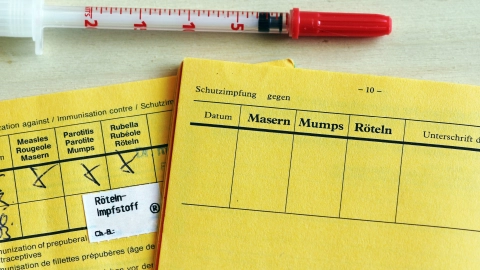Conditions Infection with cytomegalovirus (CMV)
ICD codes: B25 P35.1 What are ICD codes?
For most people, infections with cytomegalovirus (CMV) are harmless and go unnoticed. However, unborn babies in the womb, premature babies and people with an immune deficiency can become severely ill from it. Good hygiene can reduce the risk of infection.
At a glance
- Cytomegalovirus (CMV) belongs to the family of herpes viruses.
- Infection with CMV is usually harmless for people with a healthy immune system.
- After the initial infection, CMV remains in the body in a lifelong “dormant phase”, mostly going unnoticed, but can be reactivated at a later point under certain circumstances.
- The infection can cause serious complications in unborn babies in the womb, premature babies and people with immune deficiency.
- There is no vaccine against CMV. However there are some measures that reduce the risk of infection with CMV.
Note: The information in this article cannot and should not replace a medical consultation and must not be used for self-diagnosis or treatment.

What is cytomegalovirus and what happens when someone is infected with it?
Cytomegalovirus (CMV) belongs to the family of herpes viruses. The virus remains in a person’s body for the rest of their life following the initial infection. During its latency phase, it remains dormant in various cells. Under certain circumstances, however, the virus can become active again and begin to multiply. In Germany, approximately half of the adult population are carriers of CMV.
Important: The ability to remain in a person’s body for the remainder of their life following infection is a typical characteristic of all herpes viruses.
Most people with a healthy immune system do not become ill from an infection with CMV or they experience mild symptoms only.
However, a CMV infection can have serious health implications for unborn babies in the womb, premature babies, and people with an immune deficiency.
Pregnant women can pass on the cytomegalovirus to the unborn child, particularly if they are infected for the first time shortly before or during pregnancy.
Video What are infectious diseases?
The video below looks at when doctors talk about an infectious disease, which pathogens trigger infectious diseases, and how they are transmitted.
This and other videos can also be found on YouTube
Watch nowThe privacy policy indicated there applies.
What are the symptoms of CMV infection?
People can contract CMV for the first time at any age but this often happens during childhood. Symptoms generally occur 4 to 6 weeks after infection (incubation period).
Most people with a healthy immune system normally have only mild symptoms or none at all when they contract a CMV infection. Mild symptoms include cold-like symptoms, such as fatigue, high temperature, and a cough.
Premature babies and people with an immune deficiency have a greater risk of becoming seriously ill with an infection.
A severe infection may cause the following complications:
- pneumonia
- inflammation of the liver (hepatitis) and intestines (enteritis)
- inflammation of the eye, potentially causing blindness due to damage caused to the retina
It can cause growth abnormalities, damage to the brain and nervous system, and hearing impairment in children who were infected in the womb. These complications occur in up to 15 percent of children who contract the virus and, in some cases, it may take some time for them to be detected after birth.
The virus may be re-activated or a new infection may be contracted over the course of an individual’s life. Symptoms may then also occur in these cases.
What are the causes of cytomegalovirus infection?
Cytomegalovirus (CMV) is passed from person to person, for example, during close physical contact, including kissing, sexual intercourse, or breastfeeding. This type of transmission is known as smear infection. The virus may be found in saliva, tears, urine, genital secretions, blood, and breast milk. Infants and small children up to 3 years old in particular can shed large amounts of the virus.
However, CMV can also be transmitted via certain blood products and transplanted organs.
Expectant mothers can pass on CMV to their unborn child, especially if this is the first time they have been infected, but also if the virus is reactivated during pregnancy.
What are the known risk factors?
Certain groups of people are at an increased risk of becoming severely ill if they contract an infection or if the virus is re-activated in their bodies.
The high risk group includes:
- unborn babies in the womb
- premature babies
- people with an immune deficiency, i.e., a weakened immune system, such as those with HIV/AIDS or in an advanced stage of cancer
- people on immunosuppressant drugs, including cancer patients undergoing chemotherapy or transplant recipients taking drugs to prevent organ rejection
How common are CMV infections?
Various factors increase the risk of contracting an infection. These include taking care of small children, poor hygiene conditions, and having multiple sexual partners.
The proportion of people infected with CMV in the general population can only be estimated. Tests of blood donors indicate that just under half have CMV antibodies in their blood. That means they have already had their initial CMV infection.
Over half of all pregnant women and just under a quarter of all people with a kidney transplant in Germany have no cytomegalovirus antibodies. They are therefore susceptible to an initial infection with CMV. At the same time, CMV during pregnancy is responsible for most viral infections of unborn babies in the womb.
How can CMV infection be prevented?
Most people with a healthy immune system do not normally become ill from an infection with CMV. As there is no vaccine against CMV, people at a higher risk of a severe infection need to protect themselves. These include pregnant women without antibodies against CMV, premature babies, and people with a weakened immune system or those taking immunosuppressant medication.
Around one in every 200 women become infected with CMV for the first time during pregnancy. The infection goes unnoticed in most of these cases. However, it presents a risk to the unborn child, particularly in the first three months of pregnancy, and can cause severe, permanent harm, particularly to the brain and nerves.
Precautions for pregnant women with no antibodies against CMV
Good hygiene can reduce the risk of an initial infection with CMV during pregnancy. It is particularly important when having contact with small children. The recommendations below apply to pregnant women who have not yet had an initial CMV infection or do not know whether they have CMV antibodies.
Hygiene recommendations:
- thorough and frequent handwashing with soap and warm water – especially after changing diapers, washing, feeding, wiping away tears and cleaning the noses of small children, as well as after contact with toys that children have put in their mouths
- cleaning objects and surfaces that have come into contact with the urine or saliva of small children while wearing protective gloves or having these cleaned by another person
- avoiding kissing babies and infants on the mouth or cheek
- not sharing crockery, cutlery, towels and cloths with other people
- not putting pacifiers in your mouth or eating food left over by small children
Women trying for a baby can have a blood test for CMV antibodies. Under the current maternity service guidelines, the German statutory health insurance providers are not obliged to cover the costs of the test. Some do, however, so it’s worth asking.
Contact between babies and mothers who have had a CMV infection
If mothers have already had an initial CMV infection, the virus can be reactivated during breastfeeding and passed on to the baby via breast milk. This isn’t a problem for babies born at full term, but there is a risk of complications developing in premature babies. Special precautions must therefore be taken in hospitals in relation to premature babies.
Precautionary measures relating to blood products and transplanted organs
Bone marrow donors are tested for active and prior infections with CMV. This is not required for blood products: blood products that do not contain any white corpuscles are classed as safe even without a test.
Organ donations are also tested for CMV antibodies, as infection of a transplant recipient with CMV can cause severe illness and rejection of the transplanted organ because of the immunosuppressant drugs they are given. If the donor or recipient of an organ is CMV positive, taking antiviral drugs on a preventive basis may protect the recipient from becoming ill.
How is CMV infection diagnosed?
An infection can be diagnosed in the laboratory, either directly by detecting the virus itself or indirectly by detecting antibodies.
Indirect detection via an antibody test is based on a blood sample. This method is used in particular for people with a healthy immune system, for example, to determine whether a pregnant woman has previously had an initial infection with CMV. The type of CMV antibody detected is used to determine whether the infection occurred recently or a long time ago.
CMV can be detected directly in the urine, saliva, or blood. This method is used in particular for people with a weakened immune system or for newborn babies who were infected in the womb.
How is CMV infection treated?
People with a healthy immune system do not normally require any specific treatment if they contract a CMV infection.
People at an increased risk of a severe CMV infection are treated with antiviral drugs (virostatics). Ganciclovir is one example of these drugs.
If a newborn baby contracted CMV before birth, antiviral drugs should only be used following consultation with a qualified center for neonatal care. This type of treatment is not recommended for pregnant women or those who are breastfeeding.
The benefits of using antibodies against CMV (hyperimmunoglobulin) to prevent or treat an infection are currently disputed.
- Buxmann H, Hamprecht K, Meyer-Wittkopf M, Friese K. Primary Human Cytomegalovirus (HCMV) Infection in Pregnancy. Dtsch Arztebl Int. 2017 Jan 27;114(4):45-52.
- Frauenärzte im Netz. Zytomegalie in der Schwangerschaft. Aufgerufen am 23.07.2024.
- Robert Koch-Institut. Ratgeber Zytomegalievirus-Infektion. Aufgerufen am 23.07.2024.
Reviewed by the German Society for Pediatric Infectiology (Deutsche Gesellschaft für Pädiatrische Infektiologie e.V.).
As at:





